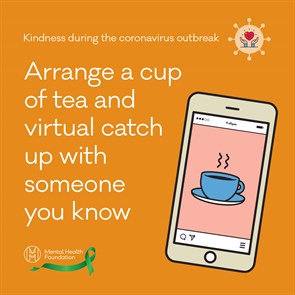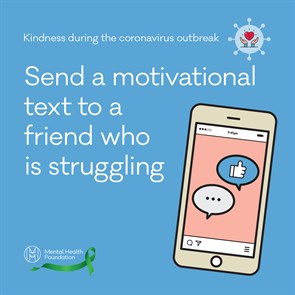How to keep mentally healthy during uncertain times
25 Mar 2020 | Adrian Bethune & Frederika Roberts
Looking after your mental health is vital, especially
when you're stuck at home

We're entering unprecedented times with this Coronavirus
pandemic. No one knows how it is going to pan out or how long it is
going to last for. An unintended consequence is that our mental
health may suffer as we keep apart from our families, friends,
neighbours and colleagues.
The good news is there are lots of positive things we
and our families can do to stay as physically and mentally healthy
as possible.
1. Keep
active


When we are physically active, it keeps our bodies healthy, our
immune system strong and our minds in tip top condition. Physical
activity burns off stress hormones like cortisol so we feel calm,
centred and energised. Why not try:
- Cleaning your house actually counts as 'moderate' activity - so
get tidying and not only will you have a work out, you'll have a
clean house too!
- Break your day up with short bursts of star-jumps, press-ups or
running on the spot.
- Get active with your kids - www.bbc.co.uk/teach/supermovers
and www.gonoodle.com
are free to use and great fun!
2. Immerse yourself in
nature

Research shows that nature can have a healing effect on our
minds and bodies. One study showed that patients recovering from
surgery whose beds overlooked a garden recovered faster than those
whose bed overlooked a carpark. Try these:
- If you have a garden, start tidying it ready for spring.
- Take care of any house plants - feed, water and prune
them.
- If it's safe to do so, spend some time in a local wood and
bathe in the natural world.
3. Focus on the present

Our minds have a tendency to ruminate on the past, or
fast-forward to the future, sometimes in a negative kind of way.
This tendency is often exacerbated during times of stress. An
antidote is to intentionally focus on the present moment - by
noticing what's happening in our minds, bodies and the external
environment with an attitude of kindness and curiosity.
- Place one hand on your belly and one hand on your chest and, as
you breathe normally in and out through your nose, count 10 full
breaths.
- Download and try one of the many free mindfulness apps like www.headspace.com
- If you find your mind racing, lie down and tune in to the
sensations in your body.
4. Laugh

Laughing feels good, boosts our immune system and helps us keep
things in perspective. Laughing with others strengthens
relationships and, because laughter is contagious, we laugh more
with others.
- Share jokes at home and online.
- Watch funny clips and films.
- Try laughter yoga; there are plenty of examples on YouTube.
There is some research evidence that even fake or forced laughter
can improve mood and wellbeing.
5. Practise kindness


In times of need, we often see the best of
humanity as people dig deep to help others.
- Offer to pick up supplies for self-isolating neighbours and
maybe now is the time to donate some money to charity.
- Be extra kind to others in your house. Tensions can run high
when we feel trapped inside. Make cups of tea, give hugs (if you're
allowed to!), pay compliments.
- Reach out to friends and family and let them know you're
thinking of them. Pick up the phone or have a video call with
grandparents so they feel connected.
6. Focus on what's good

There is ample research to show that deliberately focusing on
the good things in our lives - practising gratitude - can improve
our wellbeing. It's easy to give in to our natural
'negativity bias' as our brains strive to protect us from harm, but
we can counter that by deliberately focusing on what's good, even
during challenging times.
- At the end of each day, write down three good things about the
day, no matter how small (a rainbow in the sky, another day without
symptoms, a funny joke you heard…it's amazing what you'll notice
when you pay attention!).
- Share at least one positive story with other people each
day.
- Say 'thank you' for all the little things others do for you and
mean it.
7. Keep learning

Our minds need challenge and stimulation to stay healthy, which
is why learning new things is one of the
Five ways to wellbeing.
- All those books you don't have time to read? Read them. Read
them all!
- Take an online course. Now could be the perfect time to learn a
new skill and there are lots of great free courses on sites like www.coursera.org andwww.edx.org
- Children can research a topic they're interested in, then share
five ideas or facts they learned with someone else. Use the BBC
learning website
www.bbc.co.uk/learning/subjects/childrens_learning.shtml
8. Connect

Connecting with others is another of the 'five ways to
wellbeing'.
Research shows that people who have the richest social
relationships are the happiest; the quality of relationships has
even been linked to physical health and longevity (and academic
achievement in children). Social distancing doesn't mean you can't
keep in touch. Let people know you care and especially
contact those who may be more isolated or lonely.
- Each day, contact one person you haven't spoken to for some
time.
- Make use of technology like WhatsApp video call, facetime, Zoom
and Skype friends and family to stay in touch.
- Notice positive qualities in other people (e.g. strengths such
as perseverance, kindness, being hopeful etc) and compliment them
on those.
9. Concentrate on strengths

Character strengths are essential in supporting wellbeing.
Research (see VIA Institute
on Character) shows that recognising and working with our
strengths increases our levels of happiness.
- Identify your top five strengths and consider how these can
help you navigate these challenging times.
- Challenge family and friends to use a particular character
strength in new ways.
- Watch a film or read a book, then discuss with others the
strengths shown by different characters in the story.
Remember, nothing lasts forever, no matter how bad it is or
feels at the time. Human beings often grow and flourish through
adversity.

This is an incredibly challenging time, but we are all
in this together and we can take this opportunity to rediscover our
shared humanity.


Adrian Bethune is a primary teacher, founder of
www.teachappy.co.uk,
Education Policy Co-Lead at the Mindfulness Initiative, and the author of Wellbeing in the Primary Classroom. He tweets
@AdrianBethune
Frederika
Roberts is a former secondary teacher and a positive
psychology speaker and trainer. She is the founder of Educate to Flourish
CIC, author of
Recipe for Happiness and
For Flourishing's Sake and co-author of
Character Toolkit for Teachers. She tweets @Frederika_R